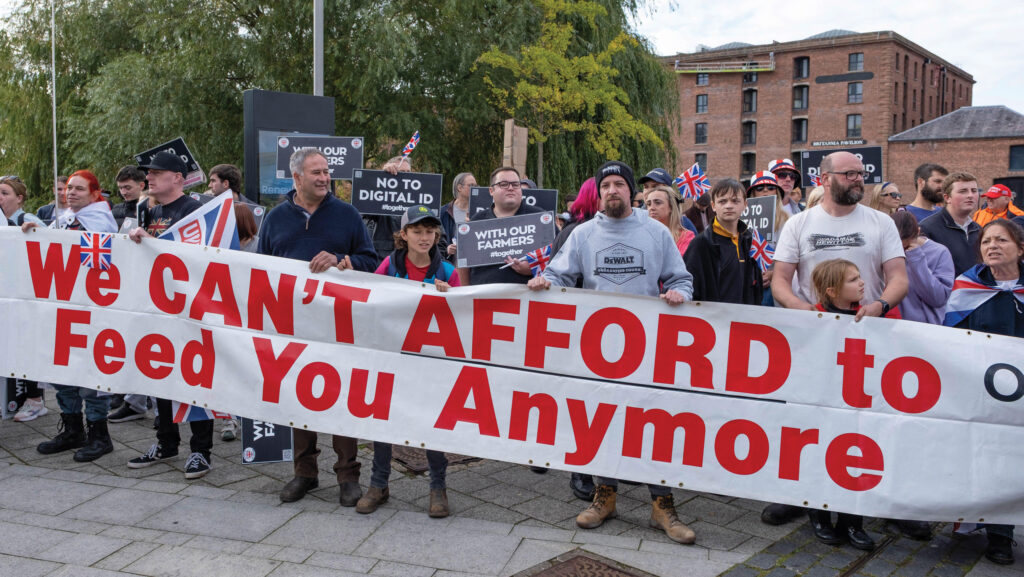Fresh SFI delay storing up ‘massive problems’ for farmers in 2026
 © Mark Lear/Alamy
© Mark Lear/Alamy Farmers in England are set to face significant cashflow shortfalls in 2026, with the new Sustainable Farming Incentive scheme not expected to open until late spring at the earliest.
As the budget for this financial year has already been spent, April would be the soonest it could be launched.
But Farmers Weekly understands other factors have contributed to the delay, including IT issues and ministerial changes at Defra.
The new iteration of the scheme is also expected to look significantly different, with industry insiders anticipating spending caps, possible competitive elements, and certain options being “bundled” together for greater environmental impact.
See also: Farmer protest greets Starmer and Labour in Liverpool
Farmer protest
Poor delivery of the Sustainable Farming Incentive (SFI) was one of the grievances aired by farmers at a protest organised by Farmers To Action at the Labour Party conference in Liverpool this week.
Martin Lines, chief executive of the Nature Friendly Farming Network UK, said the delay, coupled with the accelerated wind-down of direct support, would cause “massive problems”.
He added: “Many farmers have budgeted on a business plan that was built around a transition where area payments were phasing out slowly.
“We’re paying rent on what I thought was going to be some SFI money, some decoupled payments, and a higher value on wheat than we currently have.
“We’re being undermined by this disruption in payments.
“How can you plan and how can you reorganise tenancies to reflect the revenue opportunity from your landscape when government has shut all the schemes?”
Some upland farmers on sites of special scientific interest land are particularly at risk, as they remain in Higher Level Stewardship schemes that failed to keep pace with inflation and lost direct support.
Dr Julia Aglionby, professor of practice at the University of Cumbria, said: “Hill farmers are resilient.
“Many will adapt, introduce efficiencies and diversify, but there will be some who will say ‘there’s no point in doing this anymore’ or ‘I’ll ease back completely’, and then you’re not going to get well-managed land.”
Controlled rollout
For 2026-27, income from the new SFI is expected to be limited, as the scheme will need to open with a controlled rollout while a new IT system is tested.
The old SITI Agri software used under CAP cannot support the latest SFI.
Previous Defra analysis suggested developing a new system would take three years and is unlikely to be fully operational until 2028.
Tenant Farmers Association chief executive George Dunn said: “We have been warning for several years that there is a limit to how long you can keep an old IT system running with sticking plasters.
“The IT needed a complete overhaul four or five years ago, but here we are trying to deal with it in real time.”
A Defra spokesman said: “We are backing farmers with the largest investment in nature-friendly farming to grow their businesses, get more British food on our plates and help restore nature.
“This government inherited farming schemes that were untargeted and underspent. But, more than half of farmers are now in our schemes, meaning money is getting into their pockets.
“We will set out further updates on the reformed SFI in due course.”
Minister pledges ‘reset’ with farmers – but offers no policy updates
Defra secretary Emma Reynolds has pledged a “reset” in government-agriculture relations, but offered no updates on the Sustainable Farming Incentive (SFI) or Countryside Stewardship (CS) schemes.
Speaking at a Labour conference fringe event in Liverpool, hosted by the NFU, she promised long-term certainty and closer engagement with farmers.
Ms Reynolds stressed her commitment to listening and understanding farmers’ planning needs beyond electoral cycles.
“At the top of my inbox is to sort out the whole issue around ELM [Environmental Land Management] and SFI, and make sure you have more certainty and more time to plan,” she said.
However, the lack of clarity left farmers frustrated.
One said: “We have new ministers in position, but there was no update on the SFI or CS, only increasing the uncertainty for farmers.”
Defra is undergoing significant change, with ministers and senior civil servants moving roles, adding to uncertainty about the department’s future. In a recent cabinet reshuffle, Ms Reynolds and Angela Eagle replaced Steve Reed and Daniel Zeichner as Defra ministers.
Meanwhile, Future Farming and Countryside Programme director Janet Hughes and her deputy Jonathan Baker also recently left.
IHT policy dodged
Notably, Ms Reynolds made no mention of Labour’s plan to impose a 20% tax on inherited agricultural assets over £1m from April 2026.
NFU president Tom Bradshaw said the policy had “sapped the confidence of farmers like no other” in his experience.
He urged the government to consider an alternative from tax think-tank CenTax, recommending a “minimum share rule” and a £5m threshold to ease the burden on family farms.
